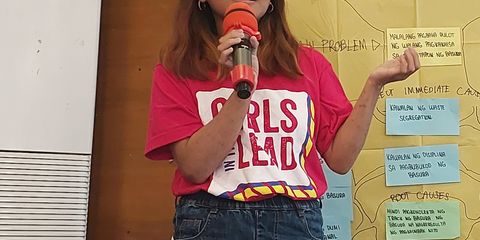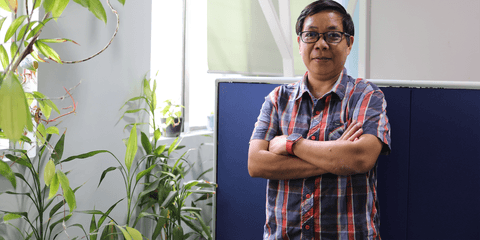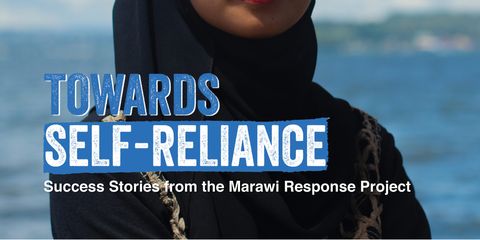How mothers overcame Typhoon Odette
6 June 2022Women-friendly spaces are helping mothers continue their lives and raise their children following Typhoon Odette.
The coast of Malimono in Surigao del Norte seemed like an unending stretch under the blistering sun. But some of the women from their community, including the 23-year-old mother Myrell, didn’t mind the heat and led the group into a shaded part of the beach, away from the bustling rebuilding in their barangay.
It was quite a coincidence when Myrell shared that she is a second-year Marine Biology student. She is also a mother with two daughters: a three-year-old, whom she had when she was only 17, and an eight-month-old baby.

Like many young teenage mothers, Myrell was not spared from judgment, even from her own parents. But instead of letting this deter her, she transformed her pain into her source of strength, using it to drive herself to work hard to lift herself out from a life of poverty. But being both a young mother and a student is not easy and Myrell admits that she struggles balancing these two aspects of her life.
Finding someone to look after her daughters has been her greatest challenge. Because her partner had already lost both of his parents, the couple relies on Myrell’s mother to look after one of her daughters while she tries to keep up with her education. Sometimes, they would even rely on help from their neighbors. She also added that the difficulty in getting an internet connection also affects her studies.
But before the typhoon, Myrell recalls how everything was still manageable. She could still keep up with her online classes as the internet was not yet cut off. However, things changed fast when the typhoon hit
“’Yung time na dumating ‘yung bagyo, hindi namin inaasahan eh. Nagbe-breastfeed pa po ako n’un. Tapos lumakas na po ‘yung ulan, lumakas ‘yung hangin. Habang umuulan, bumabagyo, ginagawan ko po ng paraan para makalikas po kami ng ibang bahay, para mailigtas ko lang po ‘yung anak ko.” (When the typhoon came, we didn’t expect it. I was breastfeeding at the time. Then the rain got heavier, the winds got stronger. While it rained, there was also a storm, I tried to evacuate to a different home to keep my children safe.)
Everything was ruined by the typhoon. Even Myrell’s modules were soaked because of the floods, leaving her with nothing to turn in for her classes. Still, she persevered and managed to get back on track despite the typhoon’s aftermath. Myrell’s partner was left behind to look after their home and fix their roof. At the time of the conversation, their house’s repair remains unfinished as their livelihood was also impacted by the typhoon. In the meantime, Myrell does her studying on the beach while their house gets restored.

In another barangay, there stands a covered gym that endured the strong winds and rain of Typhoon Odette. The gym houses more than six makeshift rooms made of light wood materials, with tarpaulins as roofs and flimsy curtains as doors. Since the typhoon’s passing, it has become a shelter for locals who have lost their homes amid the disaster.
One of its occupants is Josephine, a 42-year-old mother to six children. Her eldest is twelve years old with a disability, followed by a ten-year-old, a seven-year-old, and a two-year-old. Her youngest is only two months old when she was interviewed.

Before the typhoon, Josephine used to work at a nearby house and would come home after a long day to take care of her family and attend to chores. Like Myrell, she did not expect that a typhoon as strong as Odette would strike amid the COVID-19 pandemic.
As she fought back her tears, she recalled how difficult it was for her during the typhoon as she had a child with a disability. “Sa kasagsagan ng bagyo, wala akong ibang hiniling kundi magdasal. Dinasal ko sa panginoon na sana ligtas kami. Sabi ko na ‘Lord, ito na ba talaga ang katapusan?’ Pero hindi pa pala.” (During the onslaught of the typhoon, I did nothing but pray to God for our safety. I asked Him, “Lord, is this how it ends?” But it wasn’t the end yet.)
When the typhoon hit the country, Josephine was still pregnant and ended up going into labor the day after. Early in the morning, she went all the way to the Tagana-an Health Center carrying a box of clothes and things for her and her yet-to-be-born child. No vehicles could reach their area because of the fallen debris on the road. “Doon ako sa ilalim ng kakahuyan, gumagapang ako papunta doon sa health center.” (I was under the wooden debris, crawling my way to the health center.)
By the time she reached the health center in the afternoon and was assisted by the midwife, her cervix had already expanded to 7 centimeters. When they reached for her things to prepare for her baby, everything was drenched in water because of the rain. As she had nobody else with her, the midwife helped with drying out their clothes and cloth nappies.
After she gave birth, she returned to see her house destroyed. Yet despite being homeless, Josephine remained grateful that she and her family were not harmed by the typhoon.

Myrell and Josephine are mothers who both joined the Women Friendly Space (WFS) program in their respective communities. Both women have shared that attending WFS lectures have educated them on women and children’s rights, which have empowered them to take care of their children and hope for their future.
For Josephine, she was able to learn how women could legally defend themselves should they be trapped in abusive situations. “Dito ko nalaman na, sa part na ito, pwede ka pala magsampa ng kaso laban sa naging asawa mo kapag sinasaktan ka. Tapos, yung pagpapa-ano mo sa mga bata, kailangan may rights din ang bata about sa mga karahasan.” (This is where I learned that you can file a case against your husband if they hurt you. I also learned that children should also have rights that protect them from abuse.)
Josephine firmly believes that women should come forward about the abuses they endure and ask for help. She has also learned to get along well with others, stand for herself, and never let anyone belittle her.
She reflects on how the lectures have encouraged her to stay strong for her children. “Kasi maisip mo rin yung mga nilecture, maisip mo rin ganun pala, kailangan mo bumangon. Kasi ‘pag mahina ka tapos may mga anak ka, hindi pwedeng ibalewala mo ‘yun kasi natapakan ka–hindi. Kailangan mong lumaban talaga para sa magiging kinabukasan ng mga anak.” (You’ll think of the lectures and realize, that’s how it is–you have to stand up. Because if you’re weak and you have children, you can’t just give up because you were trampled on. No. You have to fight for the future of your children.)
She also shared how much she appreciates the WFS program for paving the way for women like her to interact with one another and make new friends. “Nagpasalamat po ako sa ganitong program kasi marami akong nakikilala at natututunan po. ‘Yun din ang nagbigay sa akin ng lakas ng loob para lumaban.” (I’m thankful for this program because I’ve met a lot of people and have learned a lot of things. This has encouraged me to keep fighting.)

Like Josephine, Myrell shared that she particularly liked the topic of gender-based violence. She also insightfully shared that just because women have rights and can assert them, they also shouldn’t abuse them because men also have rights and should be listened to. She continued, “…dapat may equality po, may unity din kayong dalawa.” (We should have equality, there should be unity between men and women)
Myrell also hopes to encourage other young mothers like her to never listen to naysayers, to turn their hurtful words into their strength, and to believe that they can do it. And that just like Myrell, they can rise on their own.
The Women-Friendly Spaces initiative is part of Plan International’s Emergency Response to areas affected by Typhoon Odette, made possible with funding from the United Nations Central Emergency Fund (UN CERF) and UNFPA Philippines. The program is implemented in Surigao del Norte through partnership with MARADECA Inc.


